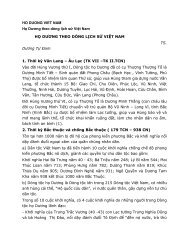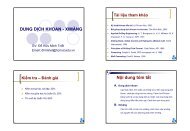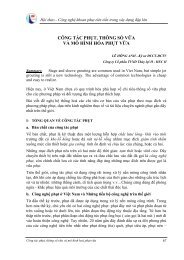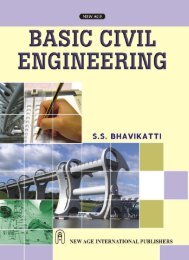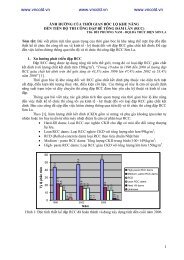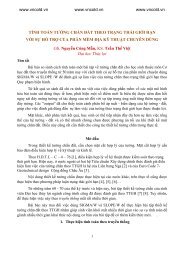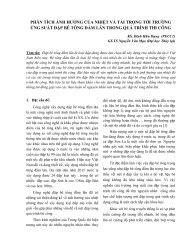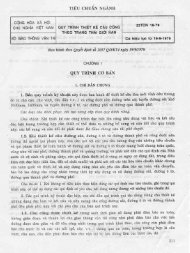- Page 2 and 3:
Civil Engineering Project Managemen
- Page 4 and 5:
Civil Engineering Project Managemen
- Page 6 and 7:
Contents Preface xiii Acknowledgeme
- Page 8 and 9:
Contents vii 4.3 Conditions publish
- Page 10 and 11:
Contents ix 10.3 The Health and Saf
- Page 12 and 13:
Contents xi 15.4 Problems with clas
- Page 14 and 15:
Preface Most civil engineering cons
- Page 16 and 17:
1 The development of construction p
- Page 18 and 19:
The great majority of all civil eng
- Page 20 and 21:
and takes over ownership of them at
- Page 22 and 23:
The development of construction pro
- Page 24 and 25:
supported by the DETR’s 7 Constru
- Page 26 and 27:
advantage is that a contractor who
- Page 28 and 29:
civil engineering, incorrect or ins
- Page 30 and 31:
The development of construction pro
- Page 32 and 33:
2 Procedures for design and constru
- Page 34 and 35:
2.3 Options for design The followin
- Page 36 and 37:
utilities in the UK continued to us
- Page 38 and 39:
Some plant suppliers, however, will
- Page 40 and 41:
• The promoter may need to employ
- Page 42 and 43:
given period of a year or longer. T
- Page 44 and 45:
3 Payment arrangements, risks and p
- Page 46 and 47:
(c) Lump sum contracts Payment arra
- Page 48 and 49:
inflation of prices after he has te
- Page 50 and 51:
Payment arrangements, risks and pro
- Page 52 and 53:
Payment arrangements, risks and pro
- Page 54 and 55:
if not, to make some deletion to re
- Page 56 and 57: Contract conditions used for civil
- Page 58 and 59: D&C contracts are often used when t
- Page 60 and 61: 4.3 Conditions published by the Int
- Page 62 and 63: authorities. A range of standard fo
- Page 64 and 65: Contract conditions used for civil
- Page 66 and 67: 5.2 Roles of the key participants i
- Page 68 and 69: Preparing contract documents 53 the
- Page 70 and 71: Preparing contract documents 55 mat
- Page 72 and 73: work. Some methods may need to be s
- Page 74 and 75: personnel may also be included. Thi
- Page 76 and 77: Preparing contract documents 61 hen
- Page 78 and 79: Preparing contract documents 63 ‘
- Page 80 and 81: invited to bid for the project. Con
- Page 82 and 83: Tendering 67 If pre-qualification i
- Page 84 and 85: construction, so that they can plan
- Page 86 and 87: e avoided because they can provide
- Page 88 and 89: corrected. Where this results in an
- Page 90 and 91: 6.8 Choosing a tender Tendering 75
- Page 92 and 93: Tendering 77 • an intent that the
- Page 94 and 95: Appendix: UK Regulations UK Statuto
- Page 96 and 97: execution of the contract, but he d
- Page 98 and 99: of formwork carpenters, steel erect
- Page 100 and 101: The contractor’s site organizatio
- Page 102 and 103: The contractor’s site organizatio
- Page 104 and 105: 8.1 Introduction 8 The employer and
- Page 108 and 109: further drawings the contractor nee
- Page 110 and 111: (see References 5 and 6). But under
- Page 112 and 113: The resident engineer’s duties 97
- Page 114 and 115: The resident engineer’s duties 99
- Page 116 and 117: need to go carefully at first so th
- Page 118 and 119: The resident engineer’s duties 10
- Page 120 and 121: The resident engineer’s duties 10
- Page 122 and 123: 10 Health and safety regulations 10
- Page 124 and 125: Health and safety regulations 109 N
- Page 126 and 127: 10.5 Training As part of the drive
- Page 128 and 129: should be evaluated. This is a new
- Page 130 and 131: 10.9 The Construction (Health, Safe
- Page 132 and 133: Health and safety regulations 117 C
- Page 134 and 135: enable first aid to be given to emp
- Page 136 and 137: • The programme for construction
- Page 138 and 139: • rainfall and runoff data; • d
- Page 140 and 141: Starting the construction work 125
- Page 142 and 143: Starting the construction work 127
- Page 144 and 145: 12.2 Levelling Site surveys, invest
- Page 146 and 147: each floor. Alternatively an optica
- Page 148 and 149: instance, it will have to be starte
- Page 150 and 151: Percussion drilling Site surveys, i
- Page 152 and 153: For grading analyses of soils 4. A
- Page 154 and 155: Site surveys, investigations and la
- Page 156 and 157:
Contract state that the employer wi
- Page 158 and 159:
The drainage of clay or clay and si
- Page 160 and 161:
General files (Series 1-9) The resi
- Page 162 and 163:
If an instruction does not vary the
- Page 164 and 165:
The resident engineer’s office re
- Page 166 and 167:
The resident engineer’s office re
- Page 168 and 169:
13.8 Authorization of dayworks The
- Page 170 and 171:
The resident engineer’s office re
- Page 172 and 173:
with the engineer. If the decision
- Page 174 and 175:
Fig. 13.7. A page of a pipe stock b
- Page 176 and 177:
The resident engineer’s office re
- Page 178 and 179:
in red on a copy of the contract dr
- Page 180 and 181:
14 Programme and progress charts 14
- Page 182 and 183:
how any consequential delay to the
- Page 184 and 185:
Description EXC. & filling soil str
- Page 186 and 187:
Programme and progress charts 171 d
- Page 188 and 189:
Height A.O.D. 200m 100m Pumping sta
- Page 190 and 191:
success leads to another. By experi
- Page 192 and 193:
Table 14.1 Estimated Final Cost of
- Page 194 and 195:
Measurement and bills of quantities
- Page 196 and 197:
‘Painting items N1-N13 after erec
- Page 198 and 199:
Measurement and bills of quantities
- Page 200 and 201:
Measurement and bills of quantities
- Page 202 and 203:
Measurement and bills of quantities
- Page 204 and 205:
Measurement and bills of quantities
- Page 206 and 207:
a tender is in the tenderer’s han
- Page 208 and 209:
Measurement and bills of quantities
- Page 210 and 211:
other tenderers, etc., the contract
- Page 212 and 213:
Interim monthly payments 197 28 day
- Page 214 and 215:
Interim monthly payments 199 paid t
- Page 216 and 217:
Interim monthly payments 201 into d
- Page 218 and 219:
or for which contractual dates for
- Page 220 and 221:
Interim monthly payments 205 the co
- Page 222 and 223:
Variations and claims 207 reaching
- Page 224 and 225:
Variations and claims 209 Extensive
- Page 226 and 227:
The problem of setting rates for ne
- Page 228 and 229:
Variations and claims 213 that the
- Page 230 and 231:
costs. The problem is that borings
- Page 232 and 233:
17.10 Delay claims Variations and c
- Page 234 and 235:
Variations and claims 219 Some othe
- Page 236 and 237:
concerning a contractor’s claim,
- Page 238 and 239:
17.16 Arbitration Under the ICE con
- Page 240 and 241:
18 Earthworks and pipelines 18.1 Ex
- Page 242 and 243:
The grab has a low output rate, but
- Page 244 and 245:
match the timing of empty vehicles
- Page 246 and 247:
are then more clearly revealed. The
- Page 248 and 249:
minimum rise or fall. The preferred
- Page 250 and 251:
Earthworks and pipelines 235 The cr
- Page 252 and 253:
Table 19.1 Site concreting and rein
- Page 254 and 255:
Table 19.2 Site concreting and rein
- Page 256 and 257:
Site concreting and reinforcement 2
- Page 258 and 259:
Table 19.5 Site concreting and rein
- Page 260 and 261:
Site concreting and reinforcement 2
- Page 262 and 263:
Site concreting and reinforcement 2
- Page 264 and 265:
Site concreting and reinforcement 2
- Page 266 and 267:
eason, the contractor has to take s
- Page 268 and 269:
Site concreting and reinforcement 2
- Page 270 and 271:
Site concreting and reinforcement 2
- Page 272 and 273:
Acceptance of tender 76 ACE (Assn.
- Page 274 and 275:
Design options 24 et seq. Design an
- Page 276 and 277:
One stop shop 15 Opening tenders 71
- Page 278 and 279:
Time schedule of key dates 168 Tran
- Page 280 and 281:
Plate 2a. An early use of a large t
- Page 282 and 283:
Plate 4a. Rollers compacting side s
- Page 284 and 285:
Plate 6b. Steel piling sometimes do
- Page 286 and 287:
Plate 8a. Presumably somebody thoug
- Page 288 and 289:
Plate 10a. It is almost universal t
- Page 290 and 291:
Plate 12a. On any job not properly
- Page 292 and 293:
Plate 14a. The typical fluidity of
- Page 294:
Plate 16a. If reinforcement is not




